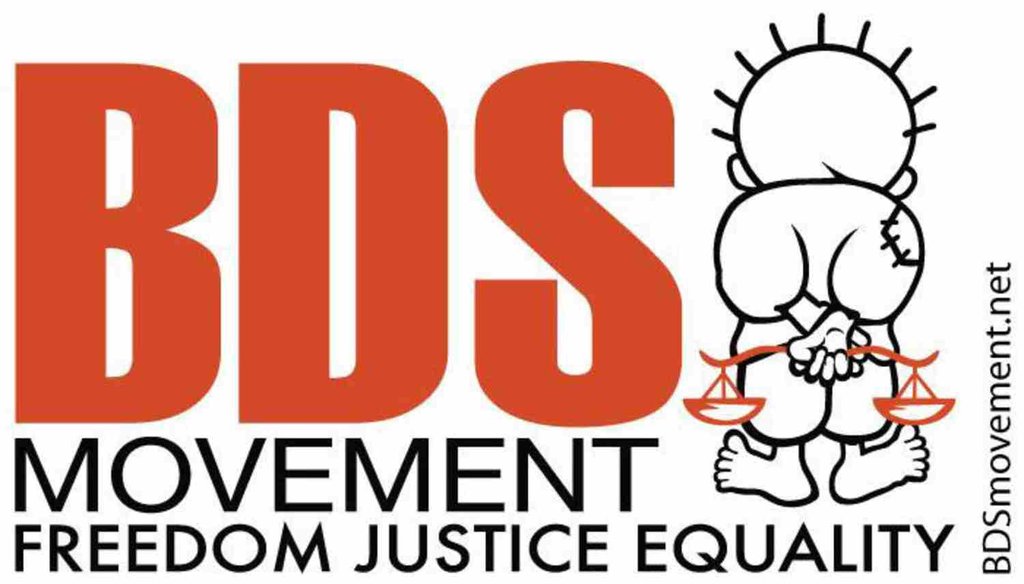Stand up for the facts!
Our only agenda is to publish the truth so you can be an informed participant in democracy.
We need your help.
I would like to contribute

The Boycott, Divestment and Sanctions (BDS) campaign logo
If it wasn’t clear that the unusual topic of U.S. foreign policy with Israel would be injected into Georgia’s close governor’s race, enter a recent editorial by GOP Gov. Nathan Deal.
The piece, co-authored by former U.N. Ambassador John Bolton, highlights the state’s solidarity with the nation 6,400 miles away.
Standing out in the discussion of business partnerships, though, is an attack against the movement known as BDS, to boycott, divest and sanction Israel over treatment of Arabs in the West Bank and Gaza.
"This ‘BDS movement’ does not merely criticize specific Israeli policies, such as Protective Edge, but instead attacks the very legitimacy of Israel itself," wrote Deal, a Republican running for re-election.
In other words, support for BDS means you oppose Zionism, the nationalist movement that supported the creation of a Jewish homeland in Israel.
Similar criticisms were leveled against former President Jimmy Carter over his comparison of Israel’s treatment of Arabs to the legal apartheid that once existed in South Africa.
And Carter’s grandson, Jason Carter, just happens to be the Democrat who running against Deal.
Asked to back up Deal’s assertion, campaign spokeswoman Jen Talaber referred us to an American Jewish Committee report, "The ideological foundations of the boycott campaign against Israel," and several other opinion pieces. She declined to make Deal available.
"It is the opinion of the governor and of John Bolton, a former US ambassador to the UN, is (sic) that the BDS Movement is a direct threat to Israel’s future," Talaber wrote in an email. "Would you like me to research the meaning of the word ‘opinion’?"
After consulting experts, documents from the movement, analysis from both sides and a slew of independent reporting, we find Deal’s statement a gross oversimplification of the issue.
But by just how much is difficult to say -- and tougher to pin down on the Truth-O-Meter -- because of the murky nature of the movement which keeps itself open to interpretation.
The BDS call to action in 2005 listed three goals: ending Israel’s occupation and colonization of Arab lands; and recognizing the rights of Arab-Palestinian citizens of Israel and the right of Palestinian refugees to return to the land they were removed from when Israel became a nation in 1948.
Most supporters of a BDS action have singled out the first goal, which the movement later amended to specifically say "Arabs lands occupied in June 1967."
That change indicates support for Israel as a nation while drawing attention to land it took control of following the Six-Day War, such as East Jerusalem, the Gaza Strip and the West Bank.
Israeli settlements in those lands have drawn international rebukes. The European Union declares such settlements as illegal under international law, though the United States considers them only "illegitimate."
This summer, the Presbyterian Church (U.S.A.) became the largest denomination to divest from companies it says help continue that occupation. The carefully worded vote said the vote was not an endorsement of the overall BDS campaign and reaffirmed Israel’s right to exist.
"You can object to the policies of Israel and not be anti-Semitic," Michael Horowitz, president of the Jewish Federation of Greater Atlanta, said of such actions. "It’s a very complex issue that can’t be addressed in a sound bite. But I think the outgrowth of increased anti-Israel sentiment has resulted in an increase in anti-Semitism."
The right of return is a far more controversial and, practically speaking, challenging goal.
Advocates of BDS note that a Jewish person from anywhere in the world is welcomed to move to Israel.
They believe about five million Palestinian refugees, most descendants of those created with the birth of Israel in 1948, are due the same right – even if such action would likely effectively end Israel’s days as a Jewish state.
"You could not have had a Jewish majority without the expulsion and perpetual exile of Palestinians," said Yousef Munayyer, executive director of The Jerusalem Fund and The Palestine Center in Washington, D.C.
"Obviously the return of Palestinian refugees might change the demographics of the country, and that would pose a political challenge for Israel," Munayyer added. "But that is not a reason to deny human rights."
Human rights are the official focus of the BDS movement. Groups and people can support those non-violent tactics without being motivated by anti-Semitic or anti-Israel beliefs. This has been the case in actions by American groups, in particular.
At the same time, there are factions within the official campaign that consider all of Israel to be "Arab land," a conclusion that threatens Israel’s very existence.
Likewise, if a right to return goal translates into allowing all descendants of Arab refugees to claim land in Israel, it would likely alter Israel as a Jewish state.
"To say the BDS movement is for the elimination of Israel as a majority or exclusive Jewish state, that has a lot more accuracy," said Elliot Ratzman, an assistant professor of religion at Temple University.
"It’s dangerous to say anyone who is for BDS is a threat," Ratzman added. "But Jews in the South can vote either way, so this is partially about that dogma and partially about the Jewish vote."
Our conclusion
Our reporting shows Deal has a point about the potential threats posed by at least some supporters of the boycott movement against Israel.
Nailing down the details of exactly what that support means varies widely, though. Support for BDS in some quarters appears driven by a desire to eliminate Israel as the Jewish homeland it was founded to be. Others have adopted some of the non-violent tactics of BDS to draw attention to what they see as Israel overreach and Palestinian suffering.
In other words, there are caveats to both viewpoints. For that reason, we are unable to tip the scale one way or the other.
Our Sources
Washington Times, "A linkage for leadership in cybersecurity: Georgia and Israel collaborate to defeat a shared threat," Aug. 1, 2014
The New York Times, "To save Israel, boycott the settlements," March 18, 2012
The American Jewish Committee, "The Ideological foundations of the boycott campaign against Israel," September 2007
Commentary, "Hate Speech illustrates the true face of BDS," March 25. 2014
Huffington Post,"Jimmy Carter apologizes to Jews in open letter," March 18, 2010
Atlanta Journal-Constitution Political Insider, "ADL chief reverses himself," March 29, 2010
The BDS movement, call to action, July 9, 2005
The BDS movement, introduction, accessed Aug. 28, 2014
The New York Times, "Presbyterians Vote to Divest Holdings to Pressure Israel," June 20, 2014
The Institute for Middle East Understanding, "On Boycott, Divestment, Sanctions (BDS)," March 9, 2012
The Institute for National Security Studies, "Image vs. Reality: The Delegitimization of Israel in the Wake of Operation Protective Edge," Aug. 20, 2014
The American Prospect, "The Rebirth of the Israeli peace movement," Aug. 5, 2010
The Daily Beast, "Why BDS doesn’t come with a map," April 19, 2012
Interview with Michael Horowitz, president of the Jewish Federation of Greater Atlanta, Aug. 28, 2014
Interview with Elliot Ratzman, religion professor at Temple University, Aug. 28, 2014
Email interview with Michael Deas, spokesman for BDS Committee, Sept. 3, 2014
Interview with Yousef Munayyer, executive director of The Jerusalem Fund and The Palestine Center, Sept. 4, 2014














































